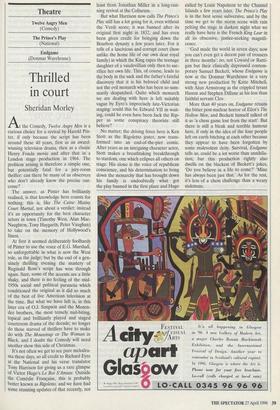Theatre
Twelve Angry Men (Comedy) The Prince's Play (National) Endgame (Donmar Warehouse)
Thrilled in court
Sheridan Morley
At the Comedy, Twelve Angry Men is a curious choice for a revival by Harold Pin- ter, if only because the script has been around these 40 years, first as an award- winning television drama, then as a classic Henry Fonda movie and after that in a London stage production in 1964. The problem arising is therefore a simple one, but potentially fatal for a jury-room thriller: can there be many of us observers who don't already know the precise out- come?
The answer, as Pinter has brilliantly realised, is that knowledge here counts for nothing: this is, like The Caine Mutiny Court Martial, not about a verdict: instead it's an opportunity for the best character actors in town (Timothy West, Alan Mac- Naughton, Tony Haygarth, Peter Vaughan) to take on the memory of Hollywood's finest.
At first it seemed deliberately foolhardy of Pinter to use the voice of E.G. Marshall, so unforgettable in what is now the West role, as the judge; but by the end of a gen- uinely thrilling evening the mastery of Reginald Rose's script has won through again. Sure, some of the accents are a little shaky, and there is no feeling of the mid- 1950s social and political paranoia which conditioned the original as it did so much of the best of live American television at the time. But what we have left is, in this later era of O.J. Simpson and the Menen- dez brothers, the most tensely nail-biting, topical and brilliantly played and staged courtroom drama of the decade; no longer do those starved of thrillers have to make do with The Mousetrap or The Woman in Black, and I doubt the Comedy will need another show this side of Christmas.
It's not often we get to see pure melodra- ma these days, so all credit to Richard Eyre at the National and his verse translator Tony Harrison for giving us a rare glimpse of Victor Hugo's Le Roi S'Amuse. Outside the Comedie Francaise, this is probably better known as Rigoletto, and we have had some stunning updates of that recently, not least from Jonathan Miller in a long-run- ning revival at the Coliseum.
But what Harrison now calls The Prince's Play still has a lot going for it, even without the Verdi score; it was banned after its original first night in 1832, and has even been given credit for bringing down the Bourbon dynasty a few years later. For it tells of a lascivious and corrupt court (how unlike the home life of our own dear royal family) in which the King rapes the teenage daughter of a vaudevillian only then to sac- rifice her own life. This, of course, leads to the body in the sack and the father's fateful discovery that it is his beloved child and not the evil monarch who has been so sum- marily despatched. Quite which monarch we are dealing with here is left suitably vague by Eyre's imprecisely late-Victorian staging: could this be Edward VII in wait- ing, could he even have been Jack the Rip- per as some conspiracy theorists still believe?
No matter; the driving force here is Ken Stott as the Rigoletto jester, now trans- formed into an end-of-the-pier comic. After years as an intriguing character actor, Stott makes a breathtaking breakthrough to stardom, one which eclipses all others on stage. His alone is the voice of republican conscience, and his determination to bring down the monarchy that has brought down his family is undoubtedly what got the play banned in the first place and Hugo exiled by Louis Napoleon to the Channel Islands a few years later. The Prince's Play is in the best sense subversive, and by the time we get to the storm scene with rain pelting the stage in darkest night what we really have here is the French King Lear in all its obsessive, justice-seeking magnifi- cence.
`God made the world in seven days; now you can't even get a decent pair of trousers in three months': no, not Coward or Ratti- gan but their clinically depressed contem- porary Samuel Beckett, whose Endgame is now at the Donmar Warehouse in a very strong new production by Katie Mitchell, with Alun Armstrong as the crippled tyrant Hamm and Stephen Dillane as his less than faithful servant Cloy.
More than 40 years on, Endgame retains the bitter post-nuclear horror of Eliot's The Hollow Men, and Beckett himself talked of it as 'a chess game lost from the start'. But there is still a bleak and terrible humour here, if only in the idea of the four people left on earth bitching at each other because they appear to have been forgotten by some malevolent deity. Survival, Endgame tells us, could be a lot worse than annihila- tion; but this production rightly also dwells on the blackest of Beckett's jokes, `Do you believe in a life to come?' Mine has always been just that.' As for the rest, it's less of a chess challenge than a weary stalemate.


























































 Previous page
Previous page